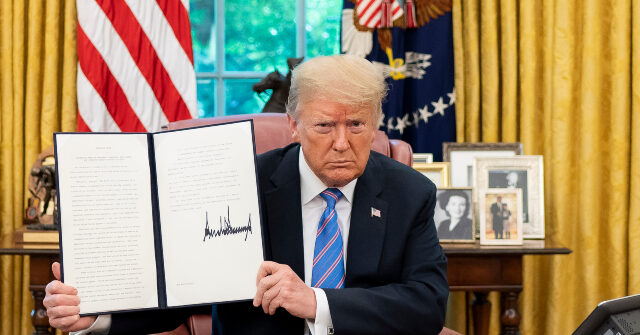The recent decision by former President Donald Trump to revoke President Joe Biden’s antitrust executive order has sparked a wave of praise from conservatives and business leaders. They argue that this move will foster a more competitive market and encourage innovation by reducing unnecessary government intervention. Many conservatives believe that this action aligns with the fundamental principles of a free market economy, where businesses can thrive without excessive regulatory constraints.
Trump’s decision is seen as a bold step towards promoting economic growth by dismantling what many perceive to be restrictive policies imposed by the previous administration. The executive order from Biden aimed to increase scrutiny on business mergers and acquisitions, but critics argue that it stifled economic expansion and hindered job creation. By revoking this order, Trump aims to create a more business-friendly environment that encourages entrepreneurship.
Supporters of Trump’s action claim that the revocation will lead to more opportunities for small businesses, which often struggle under heavy regulations. They see this as a chance for smaller companies to compete more effectively against larger corporations, thus promoting a healthier and more diverse market landscape. This aligns with conservative values of supporting individual enterprise and reducing the burden on small business owners.
The move has also been praised for potentially reducing the power of big tech companies, which have been a significant focus of antitrust discussions. By removing barriers to competition, Trump supporters believe this will level the playing field and prevent monopolistic practices. This approach is heralded as a victory for consumers, who will benefit from increased choice and lower prices in the marketplace.
Business leaders have expressed optimism that this revocation will lead to a surge in economic activity. They argue that freeing businesses from the shackles of excessive regulation will unleash innovation and drive productivity. This sentiment is echoed by conservative economists who advocate for less government intervention as a means of boosting the economy.
Critics of the Biden administration’s antitrust policies argue that they were too aggressive and counterproductive. They claim that these policies discouraged investment and slowed economic recovery post-pandemic. Trump’s action is seen as a corrective measure to realign the economy with more market-friendly policies.
The decision is also viewed as a reaffirmation of Trump’s commitment to conservative economic principles. By prioritizing deregulation, Trump is sticking to his promise of reducing the size and scope of government, which resonates with his political base. This move is likely to bolster his support among conservatives who prioritize economic freedom.
Some analysts predict that this could lead to a more dynamic and resilient economy. By encouraging competition, the revocation is expected to spur innovations that could lead to new industries and job opportunities. This is seen as a positive development for the American economy, which thrives on entrepreneurial spirit and innovation.
The business community has largely welcomed the move, with many seeing it as a return to a more predictable regulatory environment. This stability is crucial for long-term planning and investment, which are essential for sustained economic growth. By fostering a more favorable business climate, Trump’s action is seen as a catalyst for economic prosperity.
In contrast, supporters of Biden’s policies argue that antitrust measures were necessary to protect consumers and ensure fair competition. However, Trump’s supporters counter that market forces are better suited to regulate businesses than government intervention. They believe that a free market will naturally weed out bad actors and reward those who provide the best value to consumers.
This decision has reignited the debate over the role of government in regulating the economy. Conservatives argue that less regulation will lead to greater economic freedom and prosperity. They see Trump’s revocation as a step in the right direction, one that upholds the values of individual enterprise and innovation.
Many conservative commentators have praised Trump for taking decisive action to protect American businesses. They argue that the previous administration’s policies were overly restrictive and harmful to economic growth. By rolling back these regulations, Trump is seen as championing the cause of economic liberty.
Supporters of the revocation believe that it will lead to a more vibrant and competitive economy. They argue that businesses will now have more freedom to innovate and expand without fear of government interference. This is seen as a crucial factor in maintaining America’s global economic leadership.
Trump’s decision is viewed by his supporters as a necessary correction to what they see as misguided policies of the past. They believe that reducing regulatory burdens will lead to a more dynamic and prosperous economy. This aligns with the conservative belief in the power of free markets to drive economic success.
The action has been lauded as a victory for common sense and economic pragmatism. By removing unnecessary regulations, Trump is seen as fostering an environment where businesses can thrive. This is expected to lead to greater job creation and economic stability.
Conservatives argue that the revocation will benefit all Americans by promoting economic growth and increasing opportunities. They see this as a win for the free market and a testament to Trump’s commitment to conservative economic policies. This decision is hailed as a necessary step to ensure the continued prosperity of the nation.



